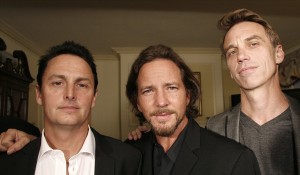
Members of the band Pearl Jam, from left, Mike McCreedy, Eddie Vedder, and Matt Cameron. AP FILE PHOTO
TORONTO—At one point in the new Pearl Jam documentary, a young Eddie Vedder flails on stage with so much intensity, he seems possessed. Considering Vedder’s been doing it now for 20 years, it begs the question: How does he come down when the houselights come up?
The question is off-putting to Vedder: He says the idea of thinking about his mindset during a performance makes him “uncomfortable.” But the 46-year-old frontman explains: “It really is like riding a wave, you know. It’s almost like — it’s like Mother Nature or something. You just kind of don’t question it. It’s like songwriting. Sometimes it’s best not to dissect.”
But Vedder and the rest of Pearl Jam were subject to much more introspection in the new film, “Pearl Jam Twenty,” directed by their good friend, director Cameron Crowe. The film explores the emotional journey of the band, from the pre-Vedder Mother Love Bone to modern-day Pearl Jam.
Vedder and the rest of Pearl Jam talked about the film recently in Toronto, where the documentary made its world premiere at the Toronto Film Festival. The band, which got its start during the grunge movement in Seattle, likes to fly under the radar: They do few interviews, and when not playing music, they maintain a low profile.
So how did such a private band decide to let the Oscar-winning Crowe make the film.
“Kicking and screaming,” says Vedder. “But if anyone was gonna do it, I guess we just put our trust in Cameron, and he in some ways was part of our group for formative stages.”
Crowe has known the band for years. The film chronicles the formation of Pearl Jam and their ups and downs. Through home movies, old interviews and intimate sit-downs with the band, Crowe weaves a narrative thread that illustrates the passionate journey behind making the music and dealing with the world around them.
“We really started cooking it up about ten years ago. We did a film called ‘Single Video Theory,’ that was around the ‘Yield’ album and Kelly, the band’s manager and I, started seeing all this footage that was not going to be usable in what we were doing. It made sense to kind of do a ‘Kids Are Alright,’ which is one of our favorite rock movies, with Pearl Jam,'” Crowe said. “So that’s where it started to come together. So over the years, it became more and more real. The about three years ago, it was like ‘OK,’ we’re doing it.’ And then it was going through the footage, which was voluminous.”
Reflecting on the music now, Vedder said he’s struck how the lyrics written then —”When we were young and naive,” he says — have a different meaning when he performs them now.
“Songwriting is about kind of writing a message to yourself in a way,” Vedder says. “It’s a reminder of how pure of a spirit you were.”
While Pearl Jam remains passionate when it comes to playing music, even more impressive is how long they’ve stayed together. With the exception of drummer Matt Cameron, who came to the band from Soundgarden in 1998, Vedder, bassist Jeff Ament, and guitarists Stone Gossard and Mike McCready have been together for two decades. That’s longer than most marriages, let alone bands.
Gossard attributes their stamina “to a lot of stubbornness.”
“Every single person in this band has gone through different periods of being disenfranchised or feeling sort of not connected to it,” Gossard says. “You have to fight it out and figure it out.”
Sometimes when bands stay together for a long time, they slip into nostalgia, playing their same hits show after show. Conversely, Pearl Jam keeps their show fresh by not subscribing to a pre-determined set list. There are songs like “Alive,” and “Yellow Ledbetter” that they play more frequently, but you can equally hear something like “Given to Fly” or “Black.” Some shows you may hear all four; other shows maybe none of them. That spontaneity seems to be a major ingredient in keeping the music fresh both for the band and their fans.
“That’s why I love Pearl Jam. They are authentic emotional and they feel every song, every night in a fresh way. … (It) is the very essence of why the band is so important to people, because every night is different,” Crowe says. “Every journey is unique and they’re listening to these meditations and messages sent back to themselves from years earlier, and you feel it on stage and on the records.”
The film has played several one-night engagements around the country, and is available on DVD on October 24. It coincides with a hardcover picturebook and a soundtrack.
Now that “Pearl Jam Twenty” has been completed, and the audiences “let in,” as Vedder describes it, the band can go back to concentrating on what’s next instead of celebrating the past.
“Now we can go back into the trenches and keep working on our own, keep working on the future and our future music again in our shadowy caves,” says Vedder.